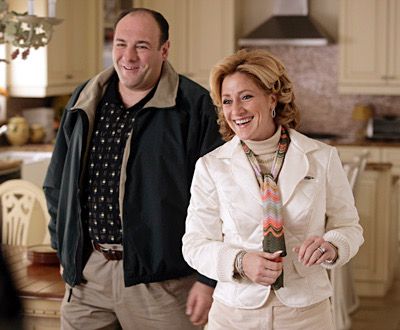
Introduction: Why The Sopranos is Unquestionably the Best TV Show of All Time
When you think of TV shows that have shaped the landscape of modern television, The Sopranos inevitably stands at the top. From its brilliant storytelling to its unforgettable characters, The Sopranos has left an indelible mark on pop culture. But what is it that makes this show so legendary? Why does it still resonate with audiences decades after its debut? Let’s explore why The Sopranos holds the crown as the best TV show of all time.
The Groundbreaking Legacy of The Sopranos
A New Era of TV: The Sopranos Redefined Storytelling
Before The Sopranos, TV was a very different animal. Shows were episodic, with a clear-cut beginning and end to each story. But Tony Soprano, played by James Gandolfini, entered our lives in 1999 and changed everything. The show’s blending of family drama with organized crime wasn’t just innovative—it was groundbreaking. It introduced viewers to a complex antihero, one who wasn’t just morally ambiguous but deeply human.
Exploring Complex Characters
What sets The Sopranos apart is its in-depth exploration of characters. Tony Soprano isn’t just a mob boss; he’s a man struggling with anxiety, depression, and a crumbling family dynamic. The show’s ability to humanize even the most ruthless characters was unprecedented. Through brilliant writing and incredible performances, The Sopranos made us see the humanity in everyone, even the villains.

Unforgettable Performances That Defined TV Acting
James Gandolfini’s Masterful Portrayal of Tony Soprano
There’s no denying that James Gandolfini’s portrayal of Tony Soprano is one of the greatest in television history. His nuanced performance brought a complexity to Tony that had never been seen in a TV protagonist before. Whether Tony was indulging in violent crime, dealing with his troubled family, or struggling with mental health issues, Gandolfini’s portrayal made him a character we couldn’t look away from.
Supporting Cast That Elevated The Show
While Gandolfini is the standout, The Sopranos is a perfect example of how a strong supporting cast can elevate a show to new heights. Edie Falco as Carmela, Michael Imperioli as Christopher Moltisanti, and Tony Sirico as Paulie Walnuts all brought depth and complexity to their roles, making The Sopranos an ensemble piece that had audiences invested in every character, not just Tony.
Masterful Writing and Pioneering Storytelling
The Show That Broke the Mold
From its first episode, The Sopranos challenged what we thought a TV show could be. It wasn’t about providing neat resolutions at the end of every episode; it was about creating a narrative that felt real. The show’s writers, led by David Chase, explored themes of power, identity, morality, and mental health in ways that were unheard of at the time.
Complex, Layered Plotlines That Keep You Coming Back
Unlike many shows that rely on formulaic plots, The Sopranos excelled in weaving intricate, often unpredictable storylines. Each season left us on the edge of our seats, never quite knowing what to expect. The show wasn’t afraid to challenge its audience, presenting multiple storylines that explored everything from organized crime to the psychology of its characters.
The Sopranos and the Rise of Prestige TV
The Show That Started the Golden Age of Television
The Sopranos is often credited with kicking off what we now call the “Golden Age of Television.” Shows like Breaking Bad, Mad Men, and Game of Thrones all owe a debt to The Sopranos for raising the bar for TV storytelling. In fact, many argue that Tony Soprano was the first true antihero in modern television, paving the way for the likes of Walter White and Don Draper.
Revolutionizing TV’s Approach to Mental Health and Family Dynamics
The show wasn’t just about the mob—it was about what goes on inside a man’s head. Tony Soprano’s therapy sessions with Dr. Melfi offered an unprecedented look at the struggles of mental health, family, and self-identity. It was groundbreaking to see a tough, emotionally distant mob boss seek help for his panic attacks and emotional turmoil. The Sopranos presented these themes with empathy and depth, allowing viewers to see vulnerability in even the most hardened of characters.
Why The Sopranos Still Matters Today
The Enduring Influence of Tony Soprano
Even though The Sopranos ended in 2007, the show’s influence can still be felt in television today. Tony Soprano’s character has become a cultural touchstone, and phrases like “whack him” or “taking care of business” still echo in popular culture. The show also brought organized crime into the homes of millions, but it did so in a way that was nuanced and intelligent.
A Show Ahead of Its Time
Looking back, The Sopranos seems almost ahead of its time. Its ability to mix highbrow, intelligent storytelling with accessible themes was revolutionary. In a landscape of more formulaic, episodic content, The Sopranos dared to defy convention—and it paid off.
The Final Season and Controversial Ending: A Fitting Conclusion?
The Bold Ending That Left Us Speechless
One of the most talked-about aspects of The Sopranos is its final episode. The series finale, titled “Made in America,” is infamous for its ambiguous ending. Did Tony survive the diner scene? Was he whacked? The final moments are designed to leave viewers questioning, and that ambiguity has sparked endless debates. While some fans were dissatisfied, others argued that the ending was the perfect way to conclude Tony’s story—leaving his fate uncertain, just like the show itself.
A Finale That Was True to the Show’s Spirit
The show’s ability to leave us with more questions than answers was a reflection of its larger themes. It wasn’t about providing closure; it was about exploring the complexity of life. Just like Tony’s struggles, the show’s ending was meant to make us think, question, and reflect.
Cultural Impact: The Sopranos’ Influence on Modern TV and Pop Culture
Shaping the Mob Genre Forever
While The Sopranos may have started as a mob drama, its impact extends far beyond that. It redefined how we view organized crime in popular culture. After The Sopranos, mob shows were no longer just about violence and crime—they became about the complexities of the people involved, their families, and their psyche.
Pop Culture References and Legacy
From references in other TV shows to cultural memes and even university courses, the legacy of The Sopranos is undeniable. Its impact on television as an art form cannot be overstated, and its cultural relevance remains strong to this day.
Conclusion: The Sopranos is Truly the Best TV Show of All Time
In conclusion, The Sopranos is not just a TV show; it’s an experience. It broke new ground in terms of storytelling, character development, and its exploration of deeper themes. The show changed the way we view television, influencing generations of writers, directors, and actors. Its profound impact on the TV landscape, combined with its unforgettable performances and compelling writing, cements its place as the greatest show of all time.
Frequently Asked Questions
1. Why is The Sopranos considered the greatest TV show?
The Sopranos is considered the greatest TV show due to its groundbreaking storytelling, unforgettable characters, and its deep exploration of complex themes like mental health, family dynamics, and organized crime.
2. Who is the most iconic character in The Sopranos?
Tony Soprano, played by James Gandolfini, is the most iconic character in the series. His portrayal of a mob boss struggling with mental health issues is one of the most memorable in TV history.
3. How did The Sopranos influence other TV shows?
The Sopranos helped to usher in the “Golden Age of Television,” influencing shows like Breaking Bad and Mad Men, which also featured morally complex characters and high-quality storytelling.
4. What is the meaning of the final scene of The Sopranos?
The final scene of The Sopranos is famously ambiguous, leaving viewers questioning whether Tony survives the diner scene. It’s a fitting conclusion that leaves the fate of Tony open to interpretation, much like the complexity of his character.
5. What themes did The Sopranos explore?
The Sopranos explored themes such as power, identity, mental health, family dynamics, and the moral gray areas of its characters. It was a groundbreaking show for its time, offering a deep dive into the human condition.